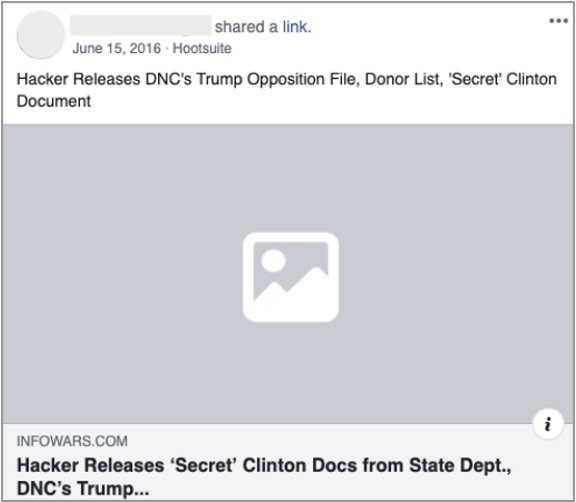SOCIAL
Facebook Removes More Accounts Due to Manipulation Efforts, Including New Push by Right-Wing ‘Proud Boys’

With the US Presidential Election looming, Facebook has this week outlined its latest round of account removals due to ‘coordinated inauthentic behavior’ – or, in other words, groups that have sought to use Facebook’s tools to manipulate Facebook’s users and their subsequent activities.
This latest set of removals, which includes operations originating from Canada, Brazil and Ukraine, also, includes a group connected to the far-right Proud Boys in the US, which Facebook initially banned back in 2018.
As per Facebook:
“The people behind this activity used fake accounts – some of which had already been detected and disabled by our automated systems – to pose as residents of Florida, post and comment on their own content to make it appear more popular than it is, evade enforcement, and manage Pages.”
The group also posted conspiracy theory posts, spreading misinformation through their networks.

Facebook says that the Pages and profiles had seemingly purchased followers to inflate their presence, but overall, the banned cluster consisted of 54 Facebook accounts, 50 Pages, and 4 accounts on Instagram.
“Around 260,000 accounts followed one or more of these Pages, and around 61,500 people followed one or more of these Instagram accounts.”
That’s significant – but even more than this, Facebook says that this cluster of accounts spent “less than $308,000” on Facebook and Instagram ads.
“Less than $308,000” seems like an odd way to put it – these pages spent a huge amount on promoting their posts, and pushing their various agendas.
To get an estimate on the impact of such activity, I put $308k as my ad budget into Facebook ads manager just now, and it estimated that my ad would reach around 17.8 million people. And while there is more to it than that (relating to targeting, scheduling, etc.), spending that amount of money would have enabled this group to reach a lot of people, spreading misinformation and hate speech throughout the platform.
Facebook has removed the group, so this particular issue has been addressed. But those loose estimates once again underline the potential scope of such activities, and how Facebook can be weaponized for indoctrination through skewed views.
As noted, Facebook banned Proud Boys back in 2018 after designating them as a hate group. More recently, Facebook has taken further action against Proud Boys linked groups, and other right-wing organizations, in response to content and activity around the #BlackLivesMatter protests. That, in some ways, represents a more proactive approach to hate speech by The Social Network – but Facebook has also come under fire for allowing controversial comments from US President Donald Trump to remain up on its platform, which many say is still facilitating hate speech.
Facebook is yet to shift its stance on such, but the pressure continues to mount. Currently, Facebook is in the midst of an advertiser boycott, which will cost it millions, or more, over the course of 2020, while this week, a Facebook-commissioned civil rights audit savaged the company’s handling of Trump’s comments.
Given the opposition to its approach, Facebook may still decide to take more action on hate speech, in all forms, and from all users – and as this latest finding of a comparatively small cluster of activist accounts shows, any action at all on this front is important.
The fact is that Facebook’s distribution system favors extremist groups, as their messaging is more incendiary, more biased, and more likely to spark debate and argument. Facebook would term such ‘engagement’, and its entire eco-system is built around fueling that activity.
Given this, every step that Facebook can take to address this, due to its massive scale and reach, is significant in the battle against divisive groups. As the community responses to the COVID-19 pandemic, and official directives around such, have shown, this is about more than facts and reason, the movements being formed are guided by political idealism, beyond logical stances, and, in large part, misinformation which construes the facts to support certain agendas.
Would such opposition gain so much traction if posts like this weren’t getting millions of clicks on Facebook?

Now consider this – would the same information gain such traction if the President of the United States, for example, had opted to take a more definitive stance on mask use?
And then, what role is Facebook, which has 1.7 billion daily active users, playing in amplifying such commentary?
Even on a smaller scale, the impact can be massive, and Facebook, whether it likes it or not, needs to assess its part in the distribution chain that fuels such movements.
SOCIAL
Snapchat Explores New Messaging Retention Feature: A Game-Changer or Risky Move?

In a recent announcement, Snapchat revealed a groundbreaking update that challenges its traditional design ethos. The platform is experimenting with an option that allows users to defy the 24-hour auto-delete rule, a feature synonymous with Snapchat’s ephemeral messaging model.
The proposed change aims to introduce a “Never delete” option in messaging retention settings, aligning Snapchat more closely with conventional messaging apps. While this move may blur Snapchat’s distinctive selling point, Snap appears convinced of its necessity.
According to Snap, the decision stems from user feedback and a commitment to innovation based on user needs. The company aims to provide greater flexibility and control over conversations, catering to the preferences of its community.
Currently undergoing trials in select markets, the new feature empowers users to adjust retention settings on a conversation-by-conversation basis. Flexibility remains paramount, with participants able to modify settings within chats and receive in-chat notifications to ensure transparency.
Snapchat underscores that the default auto-delete feature will persist, reinforcing its design philosophy centered on ephemerality. However, with the app gaining traction as a primary messaging platform, the option offers users a means to preserve longer chat histories.
The update marks a pivotal moment for Snapchat, renowned for its disappearing message premise, especially popular among younger demographics. Retaining this focus has been pivotal to Snapchat’s identity, but the shift suggests a broader strategy aimed at diversifying its user base.
This strategy may appeal particularly to older demographics, potentially extending Snapchat’s relevance as users age. By emulating features of conventional messaging platforms, Snapchat seeks to enhance its appeal and broaden its reach.
Yet, the introduction of message retention poses questions about Snapchat’s uniqueness. While addressing user demands, the risk of diluting Snapchat’s distinctiveness looms large.
As Snapchat ventures into uncharted territory, the outcome of this experiment remains uncertain. Will message retention propel Snapchat to new heights, or will it compromise the platform’s uniqueness?
Only time will tell.
SOCIAL
Catering to specific audience boosts your business, says accountant turned coach

While it is tempting to try to appeal to a broad audience, the founder of alcohol-free coaching service Just the Tonic, Sandra Parker, believes the best thing you can do for your business is focus on your niche. Here’s how she did just that.
When running a business, reaching out to as many clients as possible can be tempting. But it also risks making your marketing “too generic,” warns Sandra Parker, the founder of Just The Tonic Coaching.
“From the very start of my business, I knew exactly who I could help and who I couldn’t,” Parker told My Biggest Lessons.
Parker struggled with alcohol dependence as a young professional. Today, her business targets high-achieving individuals who face challenges similar to those she had early in her career.
“I understand their frustrations, I understand their fears, and I understand their coping mechanisms and the stories they’re telling themselves,” Parker said. “Because of that, I’m able to market very effectively, to speak in a language that they understand, and am able to reach them.”Â
“I believe that it’s really important that you know exactly who your customer or your client is, and you target them, and you resist the temptation to make your marketing too generic to try and reach everyone,” she explained.
“If you speak specifically to your target clients, you will reach them, and I believe that’s the way that you’re going to be more successful.
Watch the video for more of Sandra Parker’s biggest lessons.
SOCIAL
Instagram Tests Live-Stream Games to Enhance Engagement

Instagram’s testing out some new options to help spice up your live-streams in the app, with some live broadcasters now able to select a game that they can play with viewers in-stream.
As you can see in these example screens, posted by Ahmed Ghanem, some creators now have the option to play either “This or That”, a question and answer prompt that you can share with your viewers, or “Trivia”, to generate more engagement within your IG live-streams.
That could be a simple way to spark more conversation and interaction, which could then lead into further engagement opportunities from your live audience.
Meta’s been exploring more ways to make live-streaming a bigger consideration for IG creators, with a view to live-streams potentially catching on with more users.
That includes the gradual expansion of its “Stars” live-stream donation program, giving more creators in more regions a means to accept donations from live-stream viewers, while back in December, Instagram also added some new options to make it easier to go live using third-party tools via desktop PCs.
Live streaming has been a major shift in China, where shopping live-streams, in particular, have led to massive opportunities for streaming platforms. They haven’t caught on in the same way in Western regions, but as TikTok and YouTube look to push live-stream adoption, there is still a chance that they will become a much bigger element in future.
Which is why IG is also trying to stay in touch, and add more ways for its creators to engage via streams. Live-stream games is another element within this, which could make this a better community-building, and potentially sales-driving option.
We’ve asked Instagram for more information on this test, and we’ll update this post if/when we hear back.
-

 WORDPRESS6 days ago
WORDPRESS6 days agoTurkish startup ikas attracts $20M for its e-commerce platform designed for small businesses
-

 PPC7 days ago
PPC7 days agoA History of Google AdWords and Google Ads: Revolutionizing Digital Advertising & Marketing Since 2000
-

 MARKETING5 days ago
MARKETING5 days agoRoundel Media Studio: What to Expect From Target’s New Self-Service Platform
-

 SEO5 days ago
SEO5 days agoGoogle Limits News Links In California Over Proposed ‘Link Tax’ Law
-

 MARKETING6 days ago
MARKETING6 days agoUnlocking the Power of AI Transcription for Enhanced Content Marketing Strategies
-

 SEARCHENGINES6 days ago
SEARCHENGINES6 days agoGoogle Search Results Can Be Harmful & Dangerous In Some Cases
-
SEARCHENGINES5 days ago
Daily Search Forum Recap: April 12, 2024
-

 SEO4 days ago
SEO4 days ago10 Paid Search & PPC Planning Best Practices


